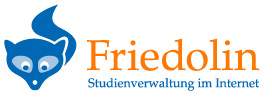| Name des Moduls | [350010] Molecular Physics and Condensed Matter | Bezeichnung des Moduls | MMC B001 |
| Studiengang | [733] - Chemistry of Materials | ECTS Punkte | 10 |
| Arbeitsaufwand für Selbststudium | 180 | Häufigkeit des Angebotes (Modulturnus) | jedes 2. Semester (ab Sommersemester) |
| Arbeitsaufwand in Präsenzstunden | 120 | Dauer des Moduls | 1 |
| Arbeitsaufwand Summe (Workload) | 300 | ||
| Modul-Verantwortliche/r | Prof. Dr Benjamin Dietzek-Ivansic, Dr Martin Presselt, Prof. Dr Volker Deckert |
| Voraussetzung für die Vergabe von Leistungspunkten (Prüfungsform) | Written or oral exam on the contents dealt with in the lecture and seminar (100%) |
| Zusätzliche Informationen zum Modul | none |
| Empfohlene Literatur | Will be recommended at the beginning of the module. |
| Unterrichtssprache | English |
| Voraussetzung für die Zulassung zum Modul | 733 MSc Chemistry of Materials: none |
| Empfohlene bzw. erwartete Vorkenntnisse | 733 MSc Chemistry of Materials: none |
| Verwendbarkeit (Voraussetzung wofür) | 733 MSc Chemistry of Materials: Module required to complete master’s thesis |
| Art des Moduls (Pflicht-, Wahlpflicht- oder Wahlmodul) | 733 MSc Chemistry of Materials: Compulsory module |
| Zusammensetzung des Moduls / Lehrformen (V, Ü, S, Praktikum, …) | Lecture (5 SWS), seminar (3 SWS)
|
| Inhalte | This adjustment module will present basic aspects of modern physics in the context of materials chemistry. Following the introduction of basic concepts of non-classical physics and conservative equations an introduction to experimental solid state and molecular physics will be given. This includes concepts of transport and structural dynamics (diffusion, charge conductivity, thermal transport, phonon transport, Drude model, plasmons). From this knowledge, in-depth considerations of the heat capacity of solids (e.g., Einstein and Debye models) will be deducted. Knowledge of lattice vibrations will be extended towards the fundamental principles of vibrational spectroscopy. Light-matter interactions, including the concept of waves and a reconsideration of geometrical and wave optics will be treated with a focus on the failure of the classical picture of matter (e.g. photo electrical effect, Stern-Gerlach). |
| Lern- und Qualifikationsziele | The students will understand basic concepts of (experimental) physics with respect to the physical phenomena and experimental concepts for studying molecules and solids. They will be able to give an oral presentation of a selected topic and defend the content to other students. |
| Voraussetzung für die Zulassung zur Modulprüfung | Oral presentation of a selected topic in the seminar. |


